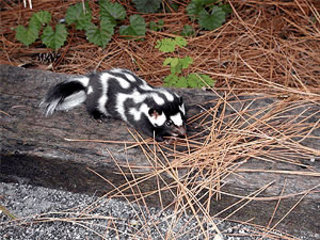
Eastern spotted skunk
Order : Carnivora
Family : Mustelidae
Subfamily : Mephitinae
Species : Spilogale putorius
The Eastern spotted skunk, spotted skunk is listed as Least Concern (LR/lc), lowest risk. Does not qualify for a more at risk category. Widespread and abundant taxa are included in this category, on the IUCN Red List of Threatened Species
Namings for the eastern spotted skunk
A young / baby of a eastern spotted skunk is called a 'kit'. A eastern spotted skunk group is called a 'surfeit or stink'.Countries
Belize, Canada, Costa Rica, El Salvador, Guatemala, Honduras, Mexico, Nicaragua and United StatesSome facts about the
Spotted skunk
Adult weight : 0.6 kg (1.32 lbs)
Maximum longevity : 11 years
Female maturity :152 days
Male maturity : 152 days
Gestation : 31 days
Weaning : 50 days
Litter size : 5
Litters per year : 2
Weight at birth : 0.01 kg (0.022 lbs)
Weight at weaning : 0.16 kg (0.352 lbs)
Basal metabolic rate : 2 W
Body mass : 0.624 kg (1.3728 lbs)
Temperature : 36.85 °C (98.33 °F)
Facts about the eastern spotted skunk
Spilogale putorius is the smallest of all the skunks and is more commonly associated with the weasel due to their elongated bodies (Kinlaw 1995).
COLORADO In Colorado, the eastern spotted skunk is known from only a few specimens
Discussion Faster and more agile than the larger skunks, the Eastern Spotted Skunk is also a good climber, ascending trees to flee predators and occasionally to forage.
Eastern Spotted Skunks are nocturnal and thusly they are active primarily at night, where they are seen foraging for food in the eastern plains.
Eastern spotted skunks are solitary except briefly during breeding in late March or early April.
It can be found in the western states, but is slightly less common in the eastern states, where its cousin, the Eastern spotted skunk is more prevalent.
The eastern spotted skunk is a omnivore, but they are more carnivorous than the stripped skunk.
The Eastern spotted skunk is hard to view "whole" because if it stands up the skunk has detected danger and may be about to respond.
The Eastern Spotted Skunk, Spilogale putorius, is much smaller and has 4 - 6 broken white stripes on the back and sides.
The tip of the tail is white while the tail tips of eastern spotted skunks are black.
The trademark defense mechanism of the Eastern Spotted Skunk is its potent and effective scent.
Locomotion: Both the Western and Eastern Spotted Skunks are faster and more agile than other skunks. (Full text)
The spotted skunk (Spilogale putorius) is rare and can be found only in the southeastern corner of the state. (Full text)
Similar Species Eastern Spotted Skunk is best distinguished by range. (Full text)
The presence of the spotted skunk (Spilogale putorius) is based upon the finding of the tail of a dead individual in the Saltbush habitat. (Full text)
More animals beginning with E
